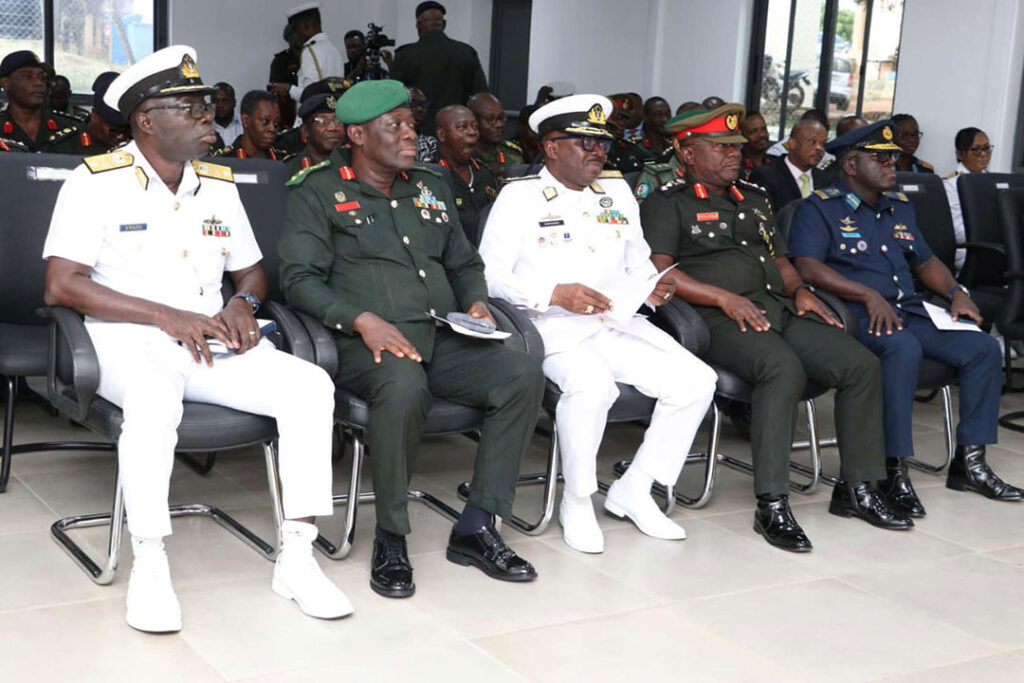ADF STAFF
Ghanaian leaders say a new era of military education and training has begun, as classes have commenced at the new war college amid plans to establish a full university system.
President Nana Akufo-Addo laid out his vision for the National Defence University (NDU) during his address at a November 17 graduation parade at the Ghana Military Academy (GMA) in Teshie, Accra.
“I’ve directed that the National Defence University be established early next year,” he said. “The university will be a multidisciplinary higher education institution that would educate personnel of the armed forces, other security agencies, governmental departments and agencies, and foreign military personnel.
“It is envisaged that it will conduct scientific research in military science, defense and strategic studies, international relations, and related subjects. It also will serve as a modern research and educational center to conduct long-term research, capacity building and policy shaping in the field of defense and security as well as current analysis and strategic studies for various state institutions.”
The NDU, he said, will be an overarching institution for Ghana’s other institutions of higher education within the Ghana Armed Forces (GAF), with campuses at the Ghana Armed Forces Command and Staff College (GAFCSC), the Kofi Annan International Peacekeeping Training Centre, National College of Defence Studies (NCDS), Ghana Military Academy and the Ghana Armed Forces Training and Doctrine Command.
The university will offer masters- and doctoral-level programs to officers and civilians working within national security and defense establishments, ministries, departments and agencies in Ghana and to students from allied African countries.
Chief of the Defence Staff Vice Adm. Seth Amoama spoke at the inauguration of Ghana’s new war college, the NCDS, on November 30, 2023, at Burma Camp in Accra.
He told senior officers that the NCDS was one piece of the GAF’s efforts to boost military capabilities and readiness.
“The program of this college aims to produce graduates imbued with leadership, critical thinking and problem-solving skills, required to address Ghana and Africa’s complex security challenges,” he said.
It is a testament to the GAF’s “unwavering commitment to providing professional military education at the strategic level — an urgently needed intervention to assist in offering possible solutions to contemporary security challenges at the strategic level.”
Among the college’s first class of 19 participants are 17 GAF senior officers, including 12 from the army, three from the navy and two from the air force. The other two students come from Ghana’s Defence and National Security ministries. The 41-week course begins on January 9, 2024.
NCDS Commandant Maj. Gen. Irvine Aryeetey hailed the occasion, calling it the start of a new era for the GAF.
“The NCDS will not be merely a place of learning but a symbol of our commitment to safeguarding our nation’s sovereignty and ensuring the safety and security of our people,” he said.
“It is here that the future leaders of our armed forces and civil servants from our ministries, departments and agencies will be nurtured and equipped with the knowledge, skills and values necessary to protect and serve Ghana.”
Earlier this year, Akufo-Addo announced that the GAF would establish the NCDS to train military personnel in modern warfare and expand professional education opportunities for the highest levels of military leadership.
Akufo-Addo said the NCDS creates a Ghanaian solution to the pervious issues caused by sending military personnel to other countries.
“Training for strategic-level appointments and staff responsibilities was provided by partner countries abroad,” he said. “This limited the number of senior officers, who receive strategic training in the Armed Forces, due to the high cost of undertaking such training abroad.”

